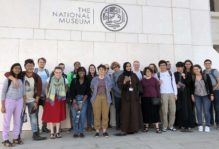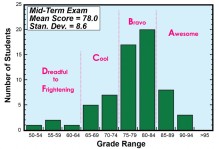Is research mostly grunt work?
Every summer, we have hundreds of W&M students on campus for a month or two, conducting research under the supervision of faculty members. I can’t prove this, but I don’t think there is another college or university in the United States that has a larger percentage of its undergraduates staying the summer and doing professional quality academic research. Dozens of these students are funded by the Charles Center via various fellowships. Two of them are working with me this summer, David Husband and Ricky Trotman. Sometimes they look happy – sometimes they appear otherwise. Let me explain.
There is this myth out there that scholarly research is all about excitement, the joy of discovery, pushing back the frontiers of human knowledge. Something like a Star Trek episode for the over-educated. But research also involves a fair amount of tedious data collection, careful measurement efforts, and frustrating trial-and-error that frankly doesn’t tax your analytical abilities all that much. Grunt work, in other words. David is working with me on a paper that links congressional party communications efforts with the legislative strategies that leaders use in committee and on the floor in Congress. On Capitol Hill, there often is no distinction between campaigning and legislating and we hope to systematically demonstrate the linkages in our paper. But an early part of the project requires that we categorize over 300 major bills by their relevance to the Democratic and Republican message agendas, which in turn entails a lot of tedious coding of legislation into various categories. David and I are regularly talking about these coding decisions, but he’s doing most of the difficult work.
Ricky is conducting research about the participation of House and Senate members on foreign policy legislation. As part of his work, he needs to gather data about who shows up during foreign policy markups (bill writing sessions in committee), which members offer amendments, and who is responsible for the shape of the foreign policy measures that get reported to the full House and Senate. Some of this information Ricky can get on-line via one of the many political subscription websites that we have at W&M. But some of the evidence also may have to be gathered in Washington, working in the relevant House and Senate committee offices. So he drove to DC today and made the rounds of committee offices. Over the afternoon, he sent me a bunch of IM’s about the way the committee receptionists were responding to his requests for help: “Huh?” “You want what?” “I’m sorry but I don’t have any idea where those records are.” And my personal favorite: “Go away, I don’t have time for you right now.” With a little more scrounging, he probably will turn up some of the records he needs in Washington. The rest we will get from the on-line sources. But I think that he has discovered a little of the frustration and legwork necessary to do original data collection about Congress.
Fortunately, all of scholarly research is not mindless tedium. David and I will use the data he is coding to write a paper that we will present together at a major scholarly conference in Chicago next spring. He’ll do a decent percentage of the writing and hopefully make the presentation himself. Ricky is also on to something with his research project, I think. No one has done a systematic analysis of member participation on foreign policy and defense issues in Congress and the topic is obviously important given what has been going on in the world. And the project should help him decide whether or not he wants to follow through with his plans to pursue a PhD in history or political science. Hopefully all of this will be enough to compensate for the grunt work.




No comments.
Comments are currently closed. Comments are closed on all posts older than one year, and for those in our archive.